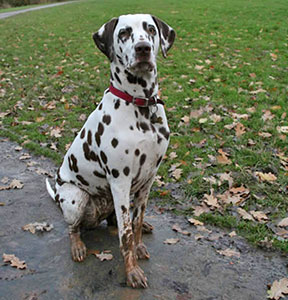Dalmatians are known for their distinctive spots and playful nature. However, there is a surprising reason why these adorable dogs should stay away from liver. It turns out that dalmatians have a unique genetic makeup that affects their ability to metabolize purines, which are found in high concentrations in liver. This genetic trait makes dalmatians more prone to developing urate crystals and urinary stones when consuming liver, leading to painful health issues.
Understanding the history and biology of dalmatians sheds light on why they cannot eat liver. Dalmatians have a deficiency in an enzyme called uricase, which is responsible for breaking down purines into uric acid. As a result, uric acid accumulates in their bodies, leading to health complications. Liver, being high in purines, exacerbates this issue. By avoiding liver and opting for a balanced diet that meets their specific nutritional needs, dalmatians can prevent the formation of urate crystals and maintain optimal health and well-being.

Why Can Dalmatians Not Eat Liver?
Dalmatians are a beautiful and unique breed of dog known for their distinct spots and energetic personality. However, there is one important dietary restriction that affects Dalmatians – they cannot eat liver. This article will explore the reasons behind this restriction, the potential health risks for Dalmatians, and alternative dietary options to ensure their well-being.
The Relationship Between Dalmatians and Uric Acid
One of the main reasons why Dalmatians cannot eat liver is due to their unique metabolism and inability to efficiently process purines. Purines are compounds found in various foods, including liver, and are broken down into uric acid by the body. While most dogs can convert uric acid into allantoin, a harmless compound that can easily be excreted through urine, Dalmatians lack a specific enzyme called urate oxidase. This enzyme is responsible for breaking down uric acid, leading to the accumulation of urate crystals in their body.
This build-up of urate crystals can cause a variety of health issues for Dalmatians, including bladder stones, urinary tract infections, and even kidney damage. Therefore, it is crucial for Dalmatian owners to be aware of this dietary restriction and avoid feeding their pets liver or any other high-purine foods.
Potential Health Risks for Dalmatians
When Dalmatians consume foods high in purines, such as liver, their bodies are unable to effectively process the uric acid produced, resulting in the formation of urate crystals. These crystals can lead to the development of bladder stones, which can cause discomfort, difficulty urinating, and even blockage of the urinary tract. In severe cases, this can ultimately lead to life-threatening conditions and the need for surgical intervention.
Furthermore, the presence of urate crystals can also result in urinary tract infections, as bacteria can attach to the crystals and thrive, causing inflammation and discomfort for the Dalmatian. If left untreated, these infections can spread to the kidneys, potentially causing irreversible damage and impacting the overall health of the dog.
Given these potential health risks, it is imperative for Dalmatian owners to be cautious about their pet’s diet and avoid feeding them liver or any food with high levels of purines. Instead, opting for a low-purine diet can help prevent these issues and ensure the well-being of their Dalmatian.
Alternative Dietary Options for Dalmatians
Although Dalmatians have this unique dietary restriction, there are still plenty of nutritious and delicious food options available for them. It is essential to provide a well-balanced diet that meets their nutritional needs without including high-purine foods.
For Dalmatians, a diet consisting of high-quality commercial dog food formulated specifically for their breed is often recommended. These specially formulated dog foods take into account the breed’s dietary needs and provide a balanced and nutritionally appropriate option. Additionally, dog food labeled as “low-purine” or “urinary care” can also be beneficial for Dalmatians.
Incorporating fresh fruits and vegetables into their diet, such as carrots, apples, and blueberries, can provide additional nutrients and variety. However, it is crucial to avoid certain high-purine fruits and vegetables like spinach, mushrooms, and cauliflower.
Consulting with a veterinarian is highly recommended to determine the best dietary plan for a Dalmatian, as each dog may have specific nutritional needs based on their age, weight, and overall health.
Common Myths About Dalmatians and Liver Consumption
There are several myths surrounding Dalmatians and their ability to consume liver. Let’s take a closer look at these misconceptions and debunk them.
Myth 1: Dalmatians Should Be Fed Liver for a Shiny Coat
One popular myth suggests that feeding Dalmatians liver will result in a shiny and healthy coat due to the high levels of vitamins and nutrients it contains. While liver is indeed a rich source of certain nutrients, including vitamin A and iron, the risks associated with its high purine content far outweigh any potential benefits to the dog’s coat. It is important to prioritize the overall health and well-being of the Dalmatian over cosmetic factors like coat appearance.
Myth 2: Small Amounts of Liver Are Safe for Dalmatians
Some people believe that feeding small amounts of liver to Dalmatians will not pose any significant health risks. However, due to the breed’s inability to metabolize purines efficiently, even small amounts can contribute to the formation of urate crystals and subsequent health issues. It is best to completely avoid liver and other high-purine foods to ensure the long-term health of the Dalmatian.
Myth 3: Liver Is Essential for Dalmatians’ Diet
Another myth suggests that liver is an essential component of a Dalmatian’s diet for optimal health. While liver does contain certain nutrients that are beneficial, they can be obtained from other sources without the risks associated with purine metabolism in Dalmatians. Providing a well-balanced diet through commercial dog food formulated for Dalmatians and consulting with a veterinarian is the best approach to ensure the dog’s nutritional needs are met.
Key Takeaways: Why Can Dalmatians Not Eat Liver?
- Dalmatians have a unique metabolism that makes it difficult for them to process purines found in liver.
- Consuming liver can lead to urate crystals forming in their urinary tract, causing painful conditions like kidney stones.
- High levels of purines in liver can exacerbate Dalmatians’ predisposition to urinary problems.
- Avoiding liver in their diet can help prevent health issues in Dalmatians.
- Consulting with a veterinarian is essential to ensure Dalmatians are provided with a balanced and suitable diet.
Frequently Asked Questions
Welcome to our FAQ section where we address common inquiries regarding the dietary restrictions of dalmatians. Below, you’ll find answers to questions related to why dalmatians cannot consume liver. Read on to learn more!
1. Why is it unsafe for dalmatians to eat liver?
Dalmatians have a unique metabolic trait that makes their bodies unable to properly process purines, which are found in high amounts in liver. When dalmatians consume liver, the purines are broken down into uric acid, leading to a buildup of this substance in their bloodstream. Increased levels of uric acid can eventually lead to the development of urinary stones, a painful and potentially dangerous condition for the dog.
To prevent this, it is recommended to avoid feeding dalmatians foods that are high in purines, which includes liver, as well as other organ meats. Instead, dalmatians should be provided with a balanced diet that meets their nutritional needs without the risk of uric acid buildup.
2. Can other dog breeds safely eat liver?
Yes, most other dog breeds can safely consume liver without any adverse effects. Unlike dalmatians, these breeds do not have the same metabolic issue with purine processing. Liver is often included in commercial dog foods as a source of nutrients and can provide various health benefits, such as being rich in vitamins and minerals.
However, even for other breeds, it’s important to maintain moderation when feeding liver. Like any organ meat, liver is high in certain nutrients and minerals, so excessive consumption can disrupt the balance of a dog’s diet. As with any food, it’s crucial to consult with a veterinarian to determine the appropriate portion and frequency of liver in a dog’s diet.
3. Are there any alternatives to liver for dalmatians?
Absolutely! Dalmatians have specific dietary needs due to their purine metabolism, and there are many alternative protein sources that can be included in their diet. Some suitable alternatives to liver for dalmatians include lean meats like chicken, turkey, or beef, as well as plant-based proteins like soy or lentils. These options provide necessary nutrients while minimizing the risk of uric acid accumulation.
It’s important to note that when introducing any new foods into a dalmatian’s diet, it’s advisable to do so gradually. Monitor the dog’s health and consult with a veterinarian to ensure the new protein sources are well-tolerated and provide the necessary nutrition for the dog’s overall well-being.
4. Are there any specific treats dalmatians can have instead of liver treats?
Yes, there are many tasty and safe treats that dalmatians can enjoy that do not involve liver. Look for treats that are specifically formulated for dalmatians or are labeled as low in purines. These treats can be made from alternative protein sources like chicken, beef, or even vegetarian options made with fruits and vegetables. Reading the ingredient list and consulting with a veterinarian can help in selecting appropriate treats for your dalmatian.
Remember, moderation is key when giving treats to any dog, including dalmatians. Treats should not exceed 10% of a dog’s daily caloric intake. Ensuring a balanced and nutritious diet is the primary goal, so treats should be given sparingly and as part of an overall healthy eating plan for your dalmatian.
5. Can dalmatians ever eat liver in small amounts?
While it’s generally not recommended for dalmatians to consume liver due to the risk of uric acid buildup and the subsequent development of urinary stones, in certain cases, small amounts of liver may be tolerated. It’s important to consult with your veterinarian before introducing any liver into a dalmatian’s diet.
The veterinarian may assess the dalmatian’s specific health condition, monitor the dog’s uric acid levels, and provide guidance on the safe amounts of liver that can be incorporated, if applicable. Remember, each dalmatian is unique, and a tailored approach is necessary to ensure their well-being and minimize any potential health risks associated with liver consumption.

Summary
Dalmatians should avoid eating liver because it can make them very sick. Liver contains a lot of vitamin A, which can be harmful to dogs, especially Dalmatians.
When Dalmatians eat liver, it can lead to an accumulation of too much uric acid in their bodies. This can cause health problems like bladder stones and urinary tract issues.
To keep our furry friends happy and healthy, it’s best to steer clear of feeding dalmatians liver. Stick to a balanced diet recommended by veterinarians to ensure their well-being.
